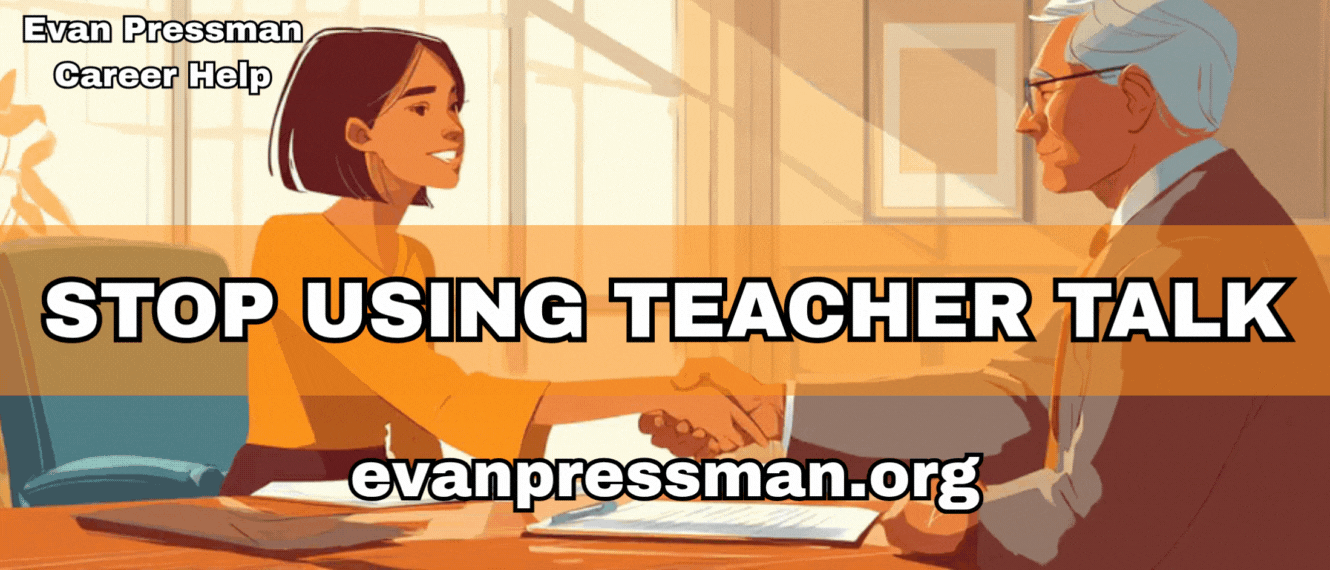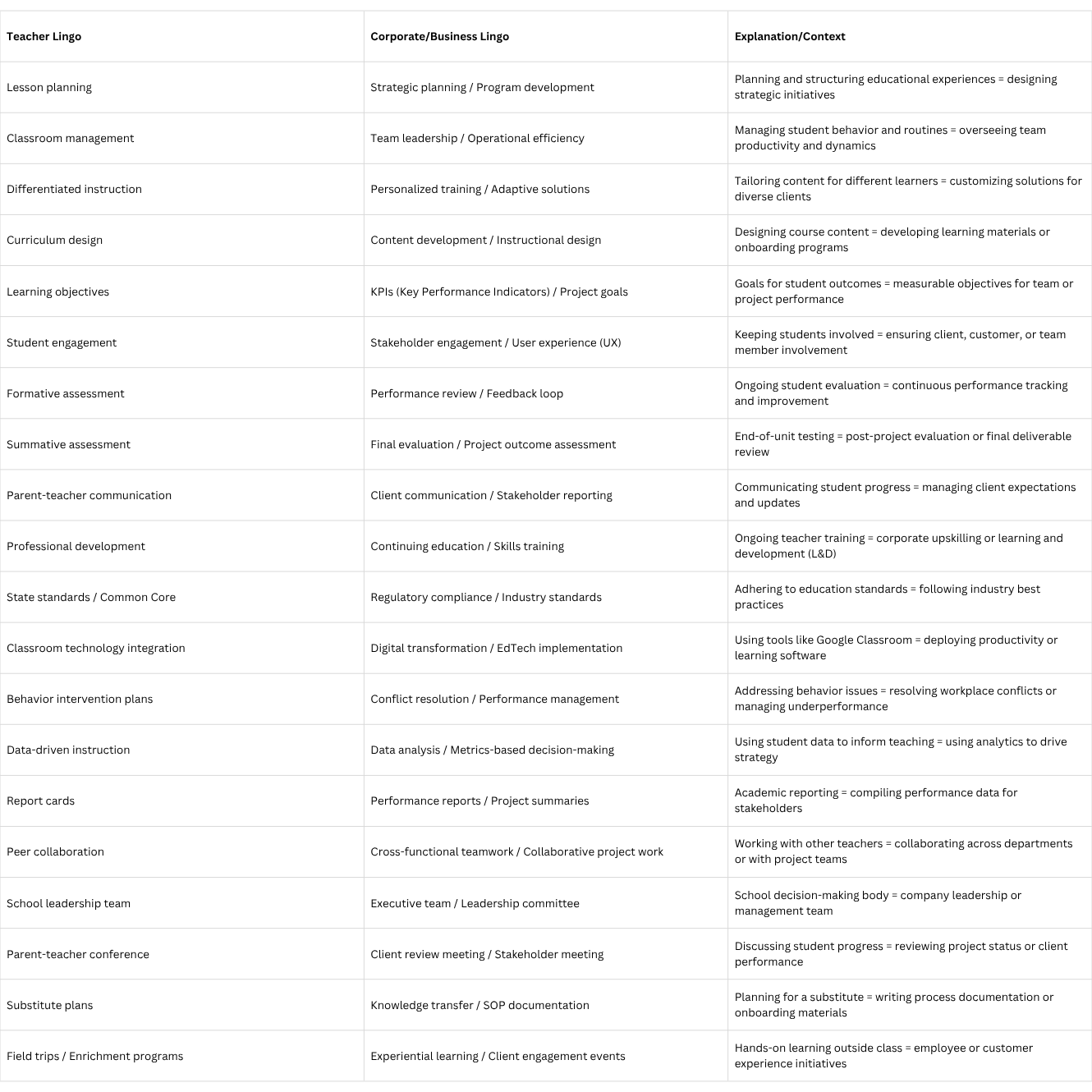From Classroom to Conference Room: Stop Using “Teacher Talk” and Start Speaking Corporate
Transitioning out of the classroom is a huge step, and I know firsthand that teachers bring SO much to the table — project management, public speaking, stakeholder communication, ability to not throw a chair at a really annoying student lol — you name it. But if you’re still using words like “lesson plan”, “classroom management”, or even “teacher” too often on your resume or LinkedIn profile, I hate to break it to you… you're probably not even getting past the applicant tracking system (ATS) or passing the sniff test of recruiters.
Don’t worry though — it’s a common learning curve. The good news? Corporate lingo can be learned, just like classroom buzzwords once were.
So let’s talk about how to ditch the “teacher talk” and start using language that doesn’t just grab the attention of hiring managers in corporate roles, but helps YOU STAND OUT.
Why Corporate Lingo Matters
When you apply for jobs outside of education, you're stepping into a whole new world of jargon. It's not just about sounding “fancy” — it's about making sure your skills translate clearly. Recruiters skim fast, and if your language doesn’t match the role, your resume might get skipped.
Here’s the reality:
Most recruiters spend less than 8 seconds scanning a resume
Corporate hiring managers often don’t understand education-specific terms
ATS systems use keyword matching, and “curriculum design” might not match “instructional design” in their system for example
Common "Teacher Terms" That Don’t Translate — And What to Use Instead
5 Ways to Learn the Lingo (Without Getting a Business Degree)
Okay, so how do you start absorbing this corporate language without feeling like you’re studying for another certification exam? Well, here are 5 ways to learn corporate lingo without relying only on watching Severance, ruining your TikTok FYP Algorithm searching this stuff, or being forced to go on Twitter:
1. Study Job Descriptions
Look at 5–10 job listings you’re interested in. What words keep popping up? Highlight phrases like:
“Stakeholder communication”
“Cross-functional collaboration”
“Performance metrics”
Then ask yourself: Where did I do this in teaching? You probably did it ALL the time — just with different terms.
Notice from this one Project Management Job Description that I see maybe 15+ terms you may have never seen if you're not a teacher. Study job descriptions, they are a goldmine for learning the lingo!
2. Update Your Resume and LinkedIn Profile
This is a biggie. Your resume needs to reflect the corporate keywords that reflect the role you want, and not just teacher language.
Instead of:
“Created engaging lesson plans and mini-lessons aligned to district standards.”
“Analyzed test scores and assignments to adjust teaching approaches.”
“Communicated with teachers and parents to give updates.”
Say:
“Created over 100+ engaging, data-driven, and accessible micro lessons to better support learners’ individual goals, optimize learning time, made content more digestible, and diversify approaches for over 100+ learners.”
“Analyzed qualitative and quantitative student scores, reported actionable and valuable insight to administration, and enhanced the quality of 250+ instructional materials for cross-functional teams and faculty.”
“Collaborated with and built transparent communications with stakeholders by creating individual success plans, getting parental and guardian buy-in, and articulating updates and progress through email, phone calls, and LMS updates for over 250+ students.”
Need help making your resume sound like that? Let me give you a free Resume Review! Check it out here:
3. Start Talking the Talk (or at least post like you talking the talk lol)
Whether it’s in your cover letters, LinkedIn posts, or interviews, practice using corporate language. You don’t need to be robotic, but you do need to show you can operate in their world. If you have nowhere to practice, start posting on LinkedIn! A $11 Canva account and some writing can go a long way for your marketing, branding, and job search; it is a WIN/WIN (start posting yesterday).
Here’s another tip when you post or practice:
Replace “my students” with “my audience,” “my clients,” or “my team”.
Swap “school” with “organization” or “company”.
🗣 Practice makes professional.
4. Listen to “Corporate” Podcasts
Not teaching podcasts — think leadership, business strategy, or HR topics. I know this is going to be a brutal transition for my True Crime Podcast fans, but it is okay to switch it up lol. Try:
🎧 HBR IdeaCast
🎧 WorkLife with Adam Grant
🎧 The Daily Job Hunt
🎧 The Goal Digger Podcast
🎧 TED Business
🎧 a16z Podcast
🎧 BLOC Podcast
👂 Bonus Tip: These podcasts are great for making an ‘Interview Cheat Sheet’ of sorts. When you hear a great tip, interview question response, quote, whatever you like - save it in a Google Document, or even in the Notes on your phone. That way, when it comes time to do your Resume, Portfolio, or Interview, you have notes READY and you will not have to go through old podcast episodes wondering where it was.
👂 Also, when you take note, save the episode number in the notes. A simple number works; if you listen to episode 165 of BLOC Podcast, for example, saving your note as “BLOC Podcast 165: blah blah blah" will save you so much time later. Be organized upfront - you want a job, be intentional!
5. Watch Corporate Training Videos on YouTube
Search “what is [job title] responsible for?” or “a day in the life of a project manager.” These videos often break down common tasks, tools, and, yes, even lingo.
🛠 I will say from my experience, the 3 PMs have extremely high levels of transferability and coverage of almost any corporate lingo you need. The 3 PMs are basically the most ‘corporate bro’ sounding roles there are, so focus on PROJECT, PROGRAM, and PRODUCT Management as your side starting point for basic lingo.
Watch Out for These Resume/LinkedIn/Portfolio Red Flags
Even if you tweak a few words, some teacher habits sneak in. The Imposter Syndrome takes over, and you try to be ‘honest’ or worry a recruiter will ‘think you are lying’. Watch for these red flags on your resume or LinkedIn:
🚫 Too much education jargon (e.g., "scaffolding," "formative assessment"):
No one outside educators has any idea what these stand for, I mean hell - I have been out of education for only 5 years and I don’t know half of the new new lingo… if you said 'scaffolding’ to 95% of folks they will think you are in construction lol. Most spell checkers think ‘summative’ isn’t even a real word - so whatever words you learned during your undergraduate, cut them out.
🚫 Listing certifications/skills that aren't relevant to corporate roles:
If you have a certification in a 100% education-based skill - remove it. Listen, I am sorry that being ‘Honors Certified in English’ took weeks to get (I have it in History, so I get it lol), but if you are applying for roles in Customer Success… no one cares lol. Same goes for your general experience skills, if you have skills that just do not match AT ALL - remove them. We are not trying to impress a recruiter with 6 pages and 50+ experience points; you’re literally diluting the stuff that really matters.
🚫 Bullet points that focus on what you did, not the impact you had:
99% of resumes focus almost only on WHAT you did, and never the IMPACT. I am not overly interested or invested in the ACTION you took - it helps for sure - but without what it did, well, why would I care? If you just put “Created educational content for 100+ learners” - alright what if you absolutely suck at it and it was actually a horrible experience for the learners lol? I have no idea! Focus on the IMPACT you made, give me a MEASURABLE RESULT that you gave; THAT is what I am looking for. Imposter Syndrome is going to convince you to focus on WHAT you did - and as someone who runs the hiring process, I truly couldn’t care less if it has no IMPACT.
🚫 Sections labeled “Education Experience” instead of “Experience”:
DO 👏 NOT 👏 GET 👏 ME 👏 STARTED 👏 LADIES 👏 AND 👏 GENTLEDUDES. Experience… is experience. Please, if you are going to use a qualifier for your experience section, “EDUCATION” is probably the worst you can pick. Also, it is just terrible for most ATS, as any qualifier can goof up the formatting and these systems can be stupid - so please just use “EXPERIENCE” and stop trying to get fancy, this screams Imposter Syndrome.
Real Examples from Teachers Who Made the Shift
Here are a few lingo transformations I have created for some clients, who went from 0 interviews to dream jobs:
👩🏫 Lara— From 5th Grade Teacher to Paralegal
Before:
“Engaged in continuous professional development through active participation in professional meetings, educational conferences, and in-service training.”
“Collaborated effectively with peers on the development and implementation of best practices and key school initiatives.”
After:
“Orchestrated and engaged in 300+ hours of immersive professional training covering instructional design, curriculum development, behavior management, and industry best practices to attain a 95% pass rate and 15% improvement in final grades.”
“Represented in school-wide initiatives and projects, collaborating with colleagues to improve school culture, curriculum, and behavior assessment scores, boosting student achievement for over 1,500+ students, and evaluating and charting assessment scores.”
👨🏫 John — From High School Teacher to Customer Success Manager
Before:
“Designed and facilitated competency-based training programs based on unique learning needs.”
“Conducted content development work with SMEs to ensure assessments aligned with learning objectives and instructional materials.”
After:
“Designed curricula aligned to organizational needs, incorporated emerging industry trends, generated interactive digital and in-person modules, and ensured alignment with client goals to deliver training to 250+ employees on average per session.”
“Collaborated with SMEs to create content, validated the accuracy of training materials, translated complex concepts into easy-to-understand language, and reviewed materials to ensure alignment with 125+ objectives.”
Want more content like this? Check out my free eBook which is 200+ pages of content just like this!
Don’t Stress — You Already Know the Stuff
The hardest part of changing your language is believing that what you’ve done matters. You’re not starting from scratch — you’re just learning to frame your experience in a way the corporate world understands.
I promise: Once you nail the lingo, everything else gets easier — job descriptions make more sense, your resume clicks, and interviews feel less like “selling yourself” and more like having a real conversation. This is going to take some time, and no, it won’t happen overnight, but eventually it will become second nature. In the same way, you had no idea what ‘summative’, ‘scaffolding’, and ‘IEP’ meant years ago - you too will know what ‘SOPs’, ‘KPIs’, and ‘Cross-Functional Collaboration’ means in no time!
Ready to Rework Your Resume?
If you’re not sure where to start, I’ve got you!
🎯 Click here to get professional help that will help you go from 0 interviews to dream job in no time — let’s make your amazing experience sound like the powerhouse it is.



